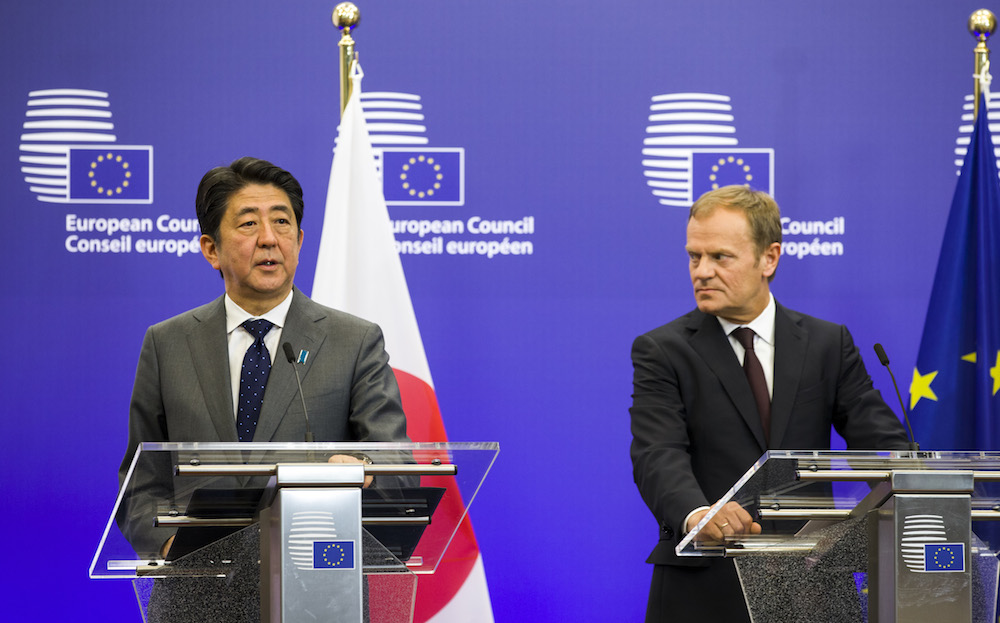EU, Japan launch big push to seal trade deal by July
Politico | 14 June 2017
EU, Japan launch big push to seal trade deal by July
By HANS VON DER BURCHARD AND JAKOB HANKE
Japanese and European negotiators are redoubling efforts to seal a political agreement early next month on what would be the EU’s biggest free trade deal.
Sources from five EU countries said the goal of the latest whirlwind of diplomatic activity is for Japanese Prime Minister Shinzō Abe to jet into Brussels for a summit July 5 or 6, ahead of a G20 summit in Hamburg on July 7. The intention is to reach a political deal covering more than 90 percent of a trade agreement, leaving only a handful of issues to be resolved later.
European Trade Commissioner Cecilia Malmström wants to cast the EU as the new global leader in free trade, and a deal with the world’s third-biggest economy would issue a defiant counter-blast against U.S. President Donald Trump’s protectionist agenda. In recent remarks, Malmström called an accord with Tokyo her “main priority in the short term.”
Trade talks have entered a “decisive” phase of two or three weeks, diplomatic sources said, with a 19th round of negotiations scheduled for next week. EU chief negotiator Mauro Petriccione will be in Tokyo beforehand, laying vital groundwork for what diplomats hope will be a final heave toward the finish line.
Japan is the EU’s sixth-biggest trading partner, and the two parties posted total trade of about €125 billion last year. Between them, the EU and Japan represent nearly 30 percent of global gross domestic product.
“We have now an excellent window of opportunity,” said Pedro Silva Pereira, the European Parliament’s rapporteur on the Japan deal. “The Japanese government has shown additional political will in the past few weeks,” he added. “We have every reason to believe that it’s moving forward.”
The lawmaker from the Portuguese Socialist Party said he had heard the EU-Japan summit would probably take place July 6.
Officially, no date has been set for the leaders’ meeting, according to a spokesperson for the European Council. A European Commission spokesperson, however, said that “leaders are committed to reaching a political agreement as soon as possible,” and added : “The next time they meet will be in connection with the G20.”
Safety net for farmers
One of Japan’s biggest concerns about sealing a deal with Europe has been fear of a backlash from its fragile farming sector, amid worries of an onslaught from mighty EU agricultural exporters. Tokyo’s parliament last week passed a package of reforms to boost Japanese farmers, which could help sweeten the bitter pill of an EU trade deal by addressing sectors such as dairy.
Some EU diplomats argue those reforms would strengthen the hand of Japan’s government in pushing for a deal, while others point out that much of Tokyo’s defensive stance on agriculture was posturing. Throughout years of negotiation, Tokyo played hardball over products such as tomatoes, pasta and cheese, in which it has no real defensive stake. Japan’s own priority has been to break down the EU’s 10 percent tariff on cars.
Silva Pereira said approval of the farm reforms was “a good sign” because it would give the Asian country more leeway in opening its agricultural market.
“We have indications that the Japanese government will make concessions on agricultural tariffs, particularly concerning pork meat and wine,” he said. “That is a very encouraging sign, and it might allow us to get a bit softer in our demands on tariffs for dairy, which have proven so difficult in these negotiations.”
One European diplomat added : “Reaching a political agreement means that everything linked to market access has to be agreed on.”
This includes tariffs, technical barriers to trade and food safety standards as well as market access for services and government procurement, he said. Brussels is also demanding that Tokyo drop the so-called operational safety clause, which gives Japanese rail companies the option to spurn European bidders for new train contracts by citing concerns over national safety standards.
What to leave out
Two key parts of the trade deal would be excluded from the political accord — investment protection and data flows, according to four European diplomats.
“It is very, very unlikely that Japan will accept the Investment Court System [proposed by the EU to solve investor-state disputes] in the short term,” one diplomat said. He added that he expected the Commission to propose leaving investment protection out of the agreement, which would allow it to be ratified at the EU level, without running a gauntlet of approvals in around 40 national and regional parliaments across the Continent.
On the subject of data flows — an issue where the commercial imperative to share consumer data collides with stringent digital privacy laws — Silva Pereira said that “the debate inside the Commission and with the European Parliament is still ongoing.” According to the rapporteur, the current EU proposal on data handling “is not mature enough to be presented in a political agreement.”
The lawmaker urged the EU and Japan not to lower their ambitions despite the race toward a seemingly imminent deadline. “The European Parliament demands an ambitious agreement, and it will be vigilant how robust the deal is, particularly when it comes to labor standards.”
Among EU diplomats, there is also a lingering skepticism over whether a political agreement will allow Brussels and Tokyo to implement the final deal soon.
“Remember the EU-Canada deal — after we reached a political agreement, it still took more than a year to finish the trade deal,” one said.






